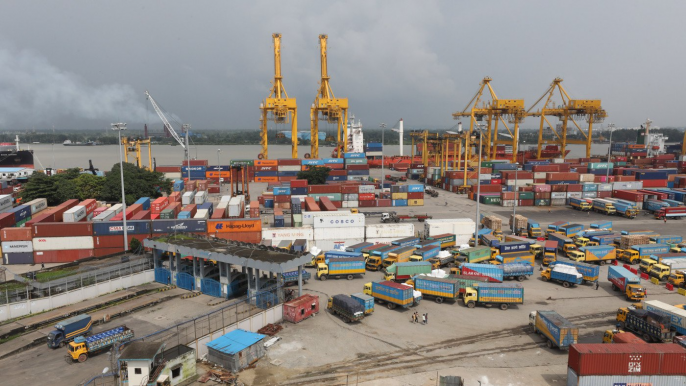Bangladeshi company Marine Trust Limited began transporting goods on the Chattogram-Kolkata route in 2017 with four ships, but the company has now stopped its shipping operations on the route.
A few other companies, including Neepa Paribahan Ltd, the first ship operating company on this route, have followed suit, causing the transportation of goods on this route to come almost to a standstill.
Industry people have attributed their pull-out to various conditions, such as a short shipment time and strictness in safety and security compliance on ships, imposed by the Indian shipping authorities.
Besides, not raising freight charges in line with the 50% hike in fuel price has prompted the companies to suspend their shipping services on the route, they say.
Now, businesses need to wait more than a month for transporting their goods on the route, despite only a 36-hour distance between Chattogram and Kolkata ports, owing to a shortage of ships.
Bangladesh and India signed a Coastal Shipping Agreement in 2015 to allow both Bangladeshi and Indian vessels to carry goods to the recognised ports. Following the agreement, direct movement of container ships between Chattogram port and Shyama Prasad Mookerjee Port Trust got underway.
But businesses are now losing out on the benefits of this deal as ship owners are now turning away from this route even after having invested crores of taka.
In the beginning, more than 10 ships of different companies would ply the route, but now only two companies have kept up their operations.
Businessmen say if this trend continues, there will be no shipping operations after 2022.
They have, therefore, demanded that the Bangladesh government resolve the existing problems and increase the number of ships on this route.
Shahikul Islam, managing director of Marine Trust Limited, told The Business Standard, “We have to face various difficulties. Even in securing permission to operate ships, we have suffered a lot. Now we have lost interest in operating vessels on this route due to various conditions imposed by the Indian shipping authorities.”
The company is now operating its four ships in inland ports, he noted, adding, “The investment of Tk80 crore would have been enough for local operations.”
Sharing a bitter experience, he said a ship called Marine Trust 1, which would ply the Chattogram-Kolkata route, met with an accident at Kolkata port in March, costing them Tk12 crore for only its recovery.
“Now Kolkata port is demanding a compensation of Tk34 crore. That means it will cost us about Tk60 crore to bring the ship back to Bangladesh and make it operational,” he noted.
The current value of the ship will be less than Tk60 crore. Besides, six out of 15 sailors, who were stranded at Kolkata port after the accident, have not been released yet, he added.
Neepa Paribahan Ltd started operating the first “Harbor 1” vessel on the route after the coastal agreement. The ship has operated 30 voyages on this route. Later, the company added another vessel named “MV Samuel” to its fleet. After the ship made five trips, the company stopped the operation of both vessels.
Nasir Ahmed Chowdhury Ripon, owner of Neepa Paribahan Limited and president of Bangladesh Container Ship Owners Association, told TBS that the Directorate General of Shipping, India, used to give permission for ships to ply this route for one year initially. But now it has come down to a month or less.
“So we have lost interest in it. Besides, the conditions given to ensure the safety and security of ships are difficult to maintain on ships plying coastal routes,” he also said.
Citing an example, Nasir Ahmed Chowdhury Ripon also said, “In the beginning, we used to spend about Tk4 lakh per month on salaries of sailors on this route. This expenditure has now increased to more than Tk10 lakh because of a jump in grades of sailors and officers and an increase in their numbers on a ship to fulfil the conditions.”
Ship owners are not able to adjust to this additional cost, he added.
Ships bring in chemicals, iron goods, billets and yarns to Chattogram port and carry empty containers and agro-processed food items to Kolkata.
The number of ships that plied this route since 2015 include Ship Harbor 1, Marin Trust 1, Marin Trust 3, Trans Samudera, Nou Kollan 1, Nou Kollan 2, Shejyoti, Invicta 1, according to shipping agent Mango Line.
The trial run of cargo ships on this route is also nearing completion under an agreement signed between Indian and Bangladesh to use Chattogram and Mongla ports for the transit of goods.
In case of transportation of goods to Kolkata, ocean-going vessels need to use transshipment ports, such as Colombo port in Sri Lanka, which takes about two weeks and costs $600 per container.
On the other hand, it takes one and a half days for the goods to reach Kolkata on ships operating under the coastal agreement. The cost is less than $200.
According to the Coastal Shipping Agreement, goods can be transported to seven ports, including Kolkata and all river ports and three seaports in Bangladesh.
Ayakub Bhuiya Sujan, managing director of MV Trans Samudera ship’s shipping agent Mango Line, said ships with a capacity of 120-200 twenty-foot equivalent units (TEUs) of containers travel from Chattogram to Kolkata. Empty container’s rent is $50-80, while the rate is $150-160 for a container filled with products. The freight charges have remained the same for the last 5 years, but the fuel cost has increased by almost %50.
Khairul Alam Sujan, vice-president of Bangladesh Freight Forwarders Association, said a business-friendly permanent policy should be introduced to keep the Chattogram-Kolkata service running so that businessmen of the two countries derive benefits from it.
Meanwhile, Port Authority Secretary Md Omar Farooq said it is a matter of policy relating to both countries. As such, he did not wish to comment on it.
Source: Hellenic Shipping News





